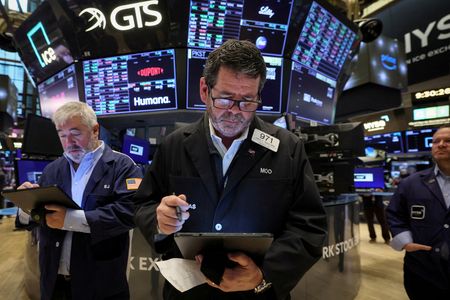 1
1 1
1
By Sinéad Carew, Ankika Biswas and Sruthi Shankar
(Reuters) – The tech-heavy Nasdaq closed slightly higher on Wednesday after strong Microsoft Corp results boosted technology shares, but the S&P 500 and the Dow fell on lingering concerns about a weakening U.S. economy and the banking sector.
Economically sensitive transport stocks had their weakest day in 11 months, and bank stocks fell as regional bank First Republic hit a record low. Investors have been jittery about the banking sector since the recent failure of two U.S. banks.
Microsoft shares rallied 7.2% following upbeat quarterly earnings and sales, including of robust artificial intelligence products. Its results boosted shares in companies such as cloud computing rival Amazon.com Inc <AMZN.O>, up 2.3%; data analytics company Datadog, up 10.5%; and data cloud giant Snowflake Inc, which closed up 8.5%.
Alphabet Inc reported better-than-expected first-quarter results and a $70-billion share buyback plan but its shares closed down 0.1%.
“The market is looking for direction on where the economy and companies are headed. We’ve had some good earnings reports come out but investors are realizing it’s not sufficient to clarify the path forward,” said Lisa Erickson, head of public markets at U.S. Bank Wealth Management in Minneapolis.
Investors are waiting for more earnings reports and a key inflation reading on Friday as well as the Federal Reserve meeting next week, Erickson said.
The Dow Jones Industrial Average fell 228.96 points, or 0.68%, to 33,301.87; and the S&P 500 lost 15.64 points, or 0.38%, at 4,055.99. The Nasdaq Composite index closed up 0.47%, or 55.19 points, at 11,854.35, according to Nasdaq.com.
The S&P 500 technology index was the sole gainer among the benchmark’s 11 major industry sectors, adding 1.7%. At its peak for the day it rose 2.8%.
But the Dow Transports average sank 3.6%, leading to its biggest two-day decline since May 2022. The index was hurt by economy jitters after Wednesday’s weaker-than-expected capital goods data and Tuesday’s weak United Parcel Service results.
New orders for key U.S.-manufactured capital goods fell more than expected in March and shipments declined, suggesting that business spending on equipment likely remained a drag on first-quarter economic growth.
Still, earnings forecasts looked way more optimistic after Tuesday evening’s bullish reports, with analysts now expecting a 3.2% contraction in first-quarter profit for S&P 500 companies compared with expectations for a 3.9% decline just a day ago.
Of the 163 S&P 500 companies that reported first-quarter profit through Wednesday morning, 79.8% topped analysts’ expectations, as per Refinitiv IBES data. In a typical quarter, 66% companies beat estimates.
However, regional lender First Republic Bank’s shares sank 29.8%, hitting a fresh record low for the second day in a row. It helped push the S&P 500 bank index down 1.4% on the day.
Investors were worried by a morning report that the U.S. government was unwilling to engineer its rescue, after the lender reported plunging deposits earlier this week.
Also, U.S. bank regulators were weighing the prospect of downgrading their private assessments of First Republic, which could curb its borrowing from the Fed, Bloomberg News reported. The bank’s shares have fallen 96.1% so far this year.
However, shares of PacWest Bancorp, another regional bank, rallied 7.5% as it beat first-quarter profit estimates and stabilized deposit outflows.
Facebook parent Meta Platforms Inc rose about 10% after the bell on its second-quarter revenue forecast that exceeded analysts’ expectations as the digital advertising market was shifting to tried and tested platforms such as Facebook and Instagram.
Activision Blizzard tumbled 11.4% after the UK’s competition regulator prevented its takeover by Microsoft on antitrust concerns.
Declining issues outnumbered advancers on the NYSE by a 2.07-to-1 ratio. The S&P 500 posted five new 52-week highs and 11 new lows.
On U.S. exchanges 11.06 billion shares changed hands compared with the 10.4 billion average for the last 20 sessions.
(Reporting by Sinéad Carew in New York, Sruthi Shankar and Ankika Biswas in Bengaluru; Editing by Vinay Dwivedi and Richard Chang)